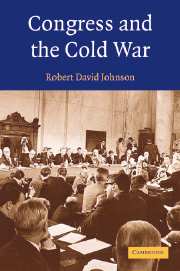Book contents
- Frontmatter
- Contents
- Abbreviations Used in the Text
- Acknowledgments
- Prologue
- Archives Consulted
- Congress and the Cold War
- 1 Constructing a Bipartisan Foreign Policy
- 2 Legislative Power and the Congressional Right
- 3 Redefining Congressional Power
- 4 The Consequences of Vietnam
- 5 The Transformation of Stuart Symington
- 6 The New Internationalists' Congress
- 7 The Triumph of the Armed Services Committee
- Appendix A The Foreign Aid Revolt of 1963
- Appendix B The Senate and U.S. Involvement in Southeast Asia, 1970–1974
- Appendix C The Senate of the New Internationalists, 1973–1976
- Appendix D The House and the End of the Cold War, 1980–1985
- Index
7 - The Triumph of the Armed Services Committee
Published online by Cambridge University Press: 05 June 2012
- Frontmatter
- Contents
- Abbreviations Used in the Text
- Acknowledgments
- Prologue
- Archives Consulted
- Congress and the Cold War
- 1 Constructing a Bipartisan Foreign Policy
- 2 Legislative Power and the Congressional Right
- 3 Redefining Congressional Power
- 4 The Consequences of Vietnam
- 5 The Transformation of Stuart Symington
- 6 The New Internationalists' Congress
- 7 The Triumph of the Armed Services Committee
- Appendix A The Foreign Aid Revolt of 1963
- Appendix B The Senate and U.S. Involvement in Southeast Asia, 1970–1974
- Appendix C The Senate of the New Internationalists, 1973–1976
- Appendix D The House and the End of the Cold War, 1980–1985
- Index
Summary
Politically, the 1978 Senate races previewed the 1980 election, which concluded with the GOP capturing control of the Senate for the first time since 1955. Ideologically, they revealed a change in public opinion that had profound institutional effects. Since the early 1960s, the new internationalists had attempted to use the institutional powers of the upper chamber to alter foreign policy – quite successfully so in the early and mid-1970s. Voters rejected this approach in 1978, producing a less active and less ideologically consistent Senate, which in turn accelerated the upper chamber's decline vis-à-vis the House.
With John Sparkman's retirement, Frank Church inherited the Foreign Relations Committee chairmanship. The Idaho senator appointed William Bader, a Carl Marcy protégé, as chief of staff; he looked to reverse the decline of both the Senate and the new internationalists by reinvigorating the committee. The task was impossible: the bipartisan Foreign Relations Committee that Arthur Vandenberg and Henry Cabot Lodge had dominated during the Truman administration and that J. William Fulbright and Stuart Symington had used so effectively to challenge Nixon's foreign policy no longer existed. Clifford Case's defeat removed him as the committee's ranking member; though the similarly inclined Jacob Javits took his place, three conservative Republicans – Jesse Helms, S. I. Hayakawa, and Richard Lugar – joined the committee. For the first time in the Cold War, conservatives formed the majority of the committee's GOP contingent; invoking its authority under the 1970 Legislative Reorganization Act, the minority hired its own staff, abandoning the committee's tradition of nonpartisan personnel policy.
- Type
- Chapter
- Information
- Congress and the Cold War , pp. 242 - 286Publisher: Cambridge University PressPrint publication year: 2005

